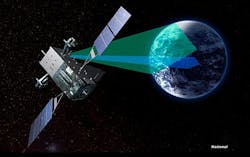Lockheed Martin gets $1.86 billion contract to complete fifth and sixth SBIRS GEO satellites
Officials of the Air Force Space and Missile System Center at Los Angeles Air Force Base/El Segundo, Calif., are asking Lockheed Martin to complete SBIRS GEO satellites 5 and 6. The contract includes options for acoustic testing, launch vehicle integration, and launch and early on-orbit testing.
The SBIRS GEO satellites provide continuous early warning of ballistic missile launches and other tactical intelligence with infrared surveillance information. The system enhances global missile launch detection capability, supports the nation's ballistic missile defense system, expands the country’s technical intelligence gathering capacity, and bolsters situational awareness for warfighters on the battlefield, Lockheed Martin officials say.
The SBIRS architecture consists of a mix of satellites in geo synchronous orbit, hosted payloads in highly elliptical orbit (HEO), and ground hardware and software. The integrated system supports several missions simultaneously, while providing global persistent surveillance.
Related: Lockheed Martin receives core for fourth SBIRS GEO satellite
With the contract modification, Lockheed Martin is responsible for six HEO payloads, six GEO satellites, and ground equipment to receive, process, and disseminate the infrared mission data. The company delivered SBIRS GEO satellite payload in 2004.
The SBIRS team is led by the Infrared Space Systems Directorate at the U.S. Air Force Space and Missile Systems Center. Lockheed Martin is the SBIRS prime contractor, Northrop Grumman is the payload integrator. Air Force Space Command operates the SBIRS system.
The second orbiting SBIRS GEO satellite was declared operational last November, eight months after launch. The first SBIRS GEO spacecraft was declared operational in May 2013.
Related: Northrop Grumman delivers SBIRS GEO-2 payload to Lockheed Martin
The third SBIRS GEO satellite passed functional integration testing of its spacecraft bus last fall and is on schedule for delivery to the Air Force this year. The fourth SBIRS GEO satellite is in production, is scheduled for delivery next year.
On the contract announced Tuesday, Lockheed Martin will do the work in Sunnyvale, Calif., and should be finished by September 2022. For more information contact Lockheed Martin Space Systems online at www.lockheedmartin.com/us/ssc, or the Air Force Space and Missile System Center at www.losangeles.af.mil.
